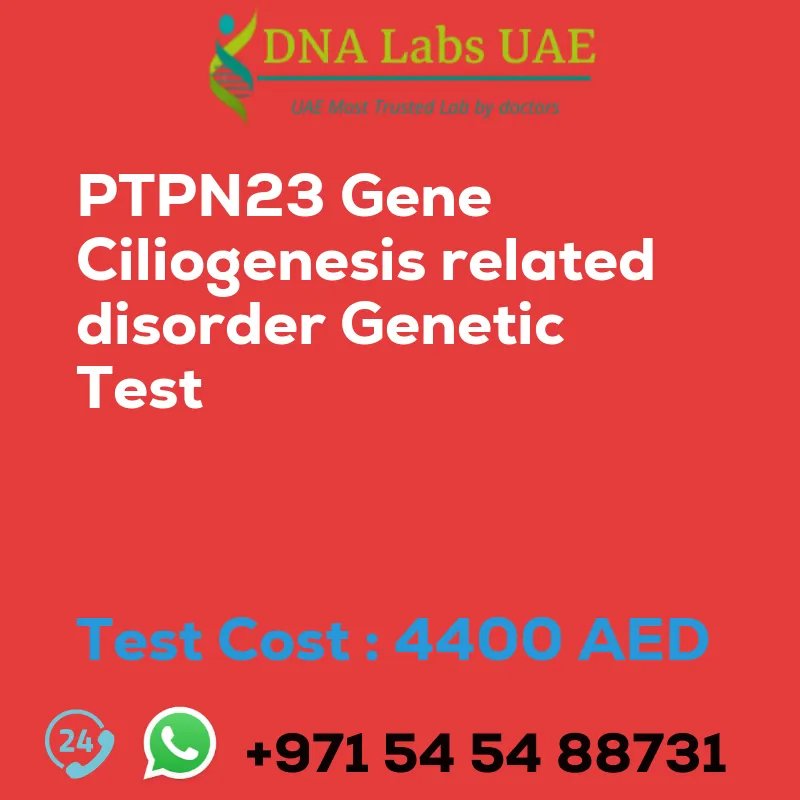PTPN23 Gene Ciliogenesis related disorder Genetic Test
At DNA Labs UAE, we offer the PTPN23 Gene Ciliogenesis related disorder Genetic Test for individuals who suspect they may have a ciliogenesis-related disorder. This test can provide valuable information for diagnosis, prognosis, and treatment decisions.
Test Components
The PTPN23 Gene Ciliogenesis related disorder Genetic Test includes:
- NGS Technology
Price
The cost of the PTPN23 Gene Ciliogenesis related disorder Genetic Test is 4400.0 AED.
Sample Condition
The test can be performed using blood or extracted DNA. Alternatively, one drop of blood can be collected on an FTA card.
Report Delivery
After the sample is collected, the report will be delivered within 3 to 4 weeks.
Test Type
The PTPN23 Gene Ciliogenesis related disorder Genetic Test focuses on Ear Nose Throat Disorders.
Doctor
The test is recommended to be conducted by an ENT Doctor.
Test Department
The PTPN23 Gene Ciliogenesis related disorder Genetic Test is conducted by our Genetics department.
Pre Test Information
Prior to the test, it is important to provide the clinical history of the patient who is going for the PTPN23 Gene Ciliogenesis related disorder NGS Genetic DNA Test. Additionally, a genetic counseling session is recommended to draw a pedigree chart of family members affected with the disorder.
Test Details
The PTPN23 gene is associated with ciliogenesis, which is the process of forming and maintaining cilia. Cilia are tiny, hair-like structures found on the surface of cells that play important roles in various cellular processes, including cell signaling, fluid movement, and sensory functions.
A ciliogenesis-related disorder can occur when there are mutations or abnormalities in the PTPN23 gene, leading to impaired cilia formation or function. This can result in a wide range of symptoms and conditions, depending on the specific gene mutation and affected tissues.
To diagnose a ciliogenesis-related disorder, a Next-Generation Sequencing (NGS) genetic test is performed. NGS is a high-throughput method that allows for the sequencing of multiple genes simultaneously. In the case of ciliogenesis-related disorders, the NGS test focuses on sequencing the PTPN23 gene to identify any mutations or abnormalities.
NGS genetic testing can provide valuable information for diagnosis, prognosis, and treatment decisions. It can help identify the specific gene mutation causing the disorder, determine the inheritance pattern, and guide appropriate management strategies.
It’s important to note that genetic testing should be performed by a qualified healthcare professional, such as a geneticist or genetic counselor, who can interpret the results and provide appropriate counseling and guidance.
| Test Name | PTPN23 Gene Ciliogenesis related disorder Genetic Test |
|---|---|
| Components | |
| Price | 4400.0 AED |
| Sample Condition | Blood or Extracted DNA or One drop Blood on FTA Card |
| Report Delivery | 3 to 4 Weeks |
| Method | NGS Technology |
| Test type | Ear Nose Throat Disorders |
| Doctor | ENT Doctor |
| Test Department: | Genetics |
| Pre Test Information | Clinical History of Patient who is going for PTPN23 Gene Ciliogenesis related disorder NGS Genetic DNA Test. A Genetic Counselling session to draw a pedigree chart of family members affected with PTPN23 Gene Ciliogenesis related disorder NGS Genetic DNA Test gene PTPN23 |
| Test Details | The PTPN23 gene is associated with ciliogenesis, which is the process of forming and maintaining cilia. Cilia are tiny, hair-like structures found on the surface of cells that play important roles in various cellular processes, including cell signaling, fluid movement, and sensory functions. A ciliogenesis-related disorder can occur when there are mutations or abnormalities in the PTPN23 gene, leading to impaired cilia formation or function. This can result in a wide range of symptoms and conditions, depending on the specific gene mutation and affected tissues. To diagnose a ciliogenesis-related disorder, a Next-Generation Sequencing (NGS) genetic test can be performed. NGS is a high-throughput method that allows for the sequencing of multiple genes simultaneously. In the case of ciliogenesis-related disorders, the NGS test would focus on sequencing the PTPN23 gene to identify any mutations or abnormalities. NGS genetic testing can provide valuable information for diagnosis, prognosis, and treatment decisions. It can help identify the specific gene mutation causing the disorder, determine the inheritance pattern, and guide appropriate management strategies. It’s important to note that genetic testing should be performed by a qualified healthcare professional, such as a geneticist or genetic counselor, who can interpret the results and provide appropriate counseling and guidance. |






